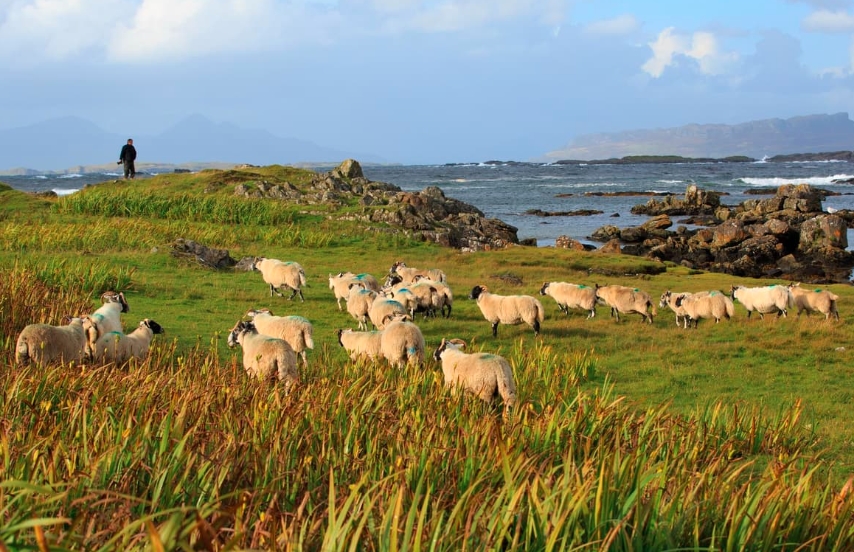The UK government’s decision to increase the minimum salary threshold for skilled worker visas has been met with fierce criticism from MSPs and rural groups in Scotland, who say it will have a devastating impact on families, businesses and communities.
Visa changes threaten to split families
The new rules, which will come into effect on 12 April 2023, will require skilled workers from outside the UK to earn at least £26,200 per year or the going rate for their occupation, whichever is higher. This is an increase from the current minimum of £25,600 per year or the going rate.
The change will affect thousands of workers in sectors such as health, social care, education, hospitality and agriculture, who are vital for the rural economy and society in Scotland. Many of them have settled in Scotland with their families and contribute to the local culture and diversity.
However, under the new rules, they may not be able to extend their visas or switch jobs, and could face deportation if they lose their employment. This could result in families being split apart and children being forced to leave their schools and friends.
One such case is that of Dr Raul Sanchez, a Spanish doctor who works as a GP in the Isle of Skye. He moved to Scotland in 2019 with his wife and two children, who are now aged 10 and 12. He earns £24,000 per year, which is below the new threshold but above the average salary for a GP in Scotland.

He said: “I love my job and my patients, and I feel very welcome here. My family is very happy and integrated in the community. My children speak Gaelic and play the bagpipes. But now we are facing the possibility of having to leave everything behind. It is very unfair and stressful. We don’t know what will happen to us.”
Rural businesses struggle to recruit and retain staff
The visa changes will also make it harder for rural businesses to recruit and retain skilled workers from outside the UK, who are often essential to fill the skills gaps and labour shortages in the region.
According to the Scottish Rural Action group, which represents the interests of rural communities, the new salary threshold does not reflect the reality of rural wages, which are often lower than urban ones due to the lower cost of living and the nature of the work.
The group’s chair, Amanda Burgauer, said: “The UK government’s one-size-fits-all approach to immigration is completely out of touch with the needs and challenges of rural Scotland. The new salary threshold will exclude many skilled workers who are crucial for our economy and society, and who have chosen to make rural Scotland their home. This will exacerbate the existing problems of depopulation, ageing and isolation in our communities.”
She added: “We need a more flexible and responsive immigration system that recognises the value and potential of rural workers, regardless of their income. We also need more devolution of immigration powers to Scotland, so that we can design policies that suit our specific circumstances and aspirations.”
MSPs and rural groups call for urgent review and reversal
The visa changes have sparked a cross-party backlash from MSPs, who have urged the UK government to review and reverse its decision, and to consult with the Scottish government and stakeholders on the impact and implications of the new rules.
The Scottish National Party (SNP) MSP for Skye, Lochaber and Badenoch, Kate Forbes, said: “The UK government’s immigration policy is a disaster for rural Scotland, and a slap in the face for the thousands of skilled workers who have made Scotland their home and who are now facing an uncertain future. The new salary threshold is arbitrary and unrealistic, and will cause untold damage to our economy, public services and communities. The UK government must rethink this ill-conceived and harmful policy, and listen to the voices of rural Scotland.”
The Scottish Labour MSP for Highlands and Islands, Rhoda Grant, said: “The UK government’s immigration policy is a betrayal of rural Scotland, and a threat to the wellbeing and prosperity of our people. The new salary threshold is discriminatory and unfair, and will create a two-tier system of workers, where some are valued more than others based on their income. The UK government must reverse this unjust and unworkable policy, and engage with the Scottish government and stakeholders on the development of a fair and humane immigration system.”
The Scottish Greens MSP for Highlands and Islands, John Finnie, said: “The UK government’s immigration policy is a disaster for rural Scotland, and a disregard for the rights and dignity of our skilled workers. The new salary threshold is absurd and irrational, and will result in the loss of many talented and dedicated workers, who enrich our economy, public services and communities. The UK government must scrap this nonsensical and harmful policy, and respect the wishes and needs of rural Scotland.”
The Scottish Rural Action group has also launched a campaign to raise awareness and mobilise opposition to the visa changes, and to demand a fair and flexible immigration system for rural Scotland. The group is encouraging rural workers, businesses and communities to share their stories and concerns, and to write to their MPs and MSPs to express their views.
The group’s chair, Amanda Burgauer, said: “We are calling on all rural Scots to stand up and speak out against the UK government’s immigration policy, which is putting our future at risk. We are asking them to join our campaign and to make their voices heard. We are also calling on the UK government to listen to rural Scotland and to change its course, before it is too late.”

















